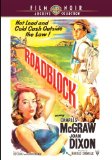| Reviews & Columns |
|
Reviews DVD TV on DVD Blu-ray 4K UHD International DVDs In Theaters Reviews by Studio Video Games Features Collector Series DVDs Easter Egg Database Interviews DVD Talk Radio Feature Articles Columns Anime Talk DVD Savant Horror DVDs The M.O.D. Squad Art House HD Talk Silent DVD
|
DVD Talk Forum |
|
|
| Resources |
|
DVD Price Search Customer Service #'s RCE Info Links |
|
Columns
|
|
|
Roadblock (Warner Archive Collection)
Arbitrary but fun little noir meller. Warner Bros.' Archive Collection line of hard-to-find cult and library titles, this time under their Film Noir banner, has released Roadblock, the 1951 crime thriller from RKO Pictures starring Charles McGraw, Joan Dixon, Lowell Gilmore, Louis Jean Heydt, and Milburn Stone. A little too cheap and speedy for its own good, Roadblock's characterization and story logic suffer, but the presence of noir icon McGraw and some quotable hard-boiled dialogue paves over some of Roadblock's p(l)otholes. No extras for this solid black and white fullscreen transfer.
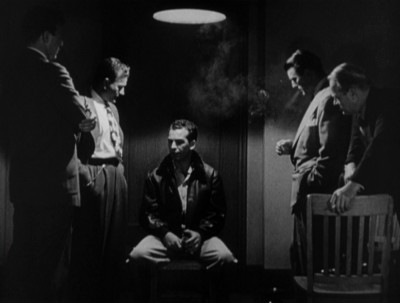
Insurance investigator Joe Peters (Charles McGraw) is taking a little bush league hoodlum for a ride. You see, Joe drilled some guy in front of this scared witness, and now it's time to tie up all the loose ends. Only the little punk says he's on the lam from John Law, too, and Joe can have all the stolen dough he stashed away in his dead uncle's crypt. Once the lettuce is in hand, Joe drops the big one: it was all a scam. Joe's on the level, and the guy he "shot" is his partner, Harry Miller (Louis Jean Heydt), alive and well. Score another one for Southwest Indemnity. Taking a plane back to the City of Angels, Joe is alternately pleased by her attention and flummoxed by good-looking dish Diane's (Joan Dixon) ability to con him and the airline into thinking she's his wife...to the tune of half-off her plane fare. Rerouted to Missouri because of a storm, the two spend the night in a hotel room...as a couple, where they get to know each other: he finds out she's a chiseler from way back with big dreams, and she lets him know what she's always known--that little runt "Honest Joe" is outta her league. Back in Hell-A, Joe and Harry are assigned to another fur store robbery, and they're pretty sure who the brain is behind the job: untouchable big criminal wheel Kendall Webb (Lowell Gilmore). Shadowing Webb, Joe sees Webb with his new conquest--money grubbing whore Diane--and it drives him nuts, so nuts he's willing to break the law to get her into his bed. Offering up a foolproof plan to rob a postal train, with the critical insider dope to make it go off without a hitch, Joe hands the info to new partner Webb, and the die is cast. Only...Diane wants to go straight, now. And it's too late for Joe.
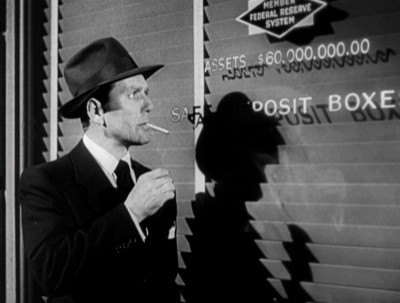
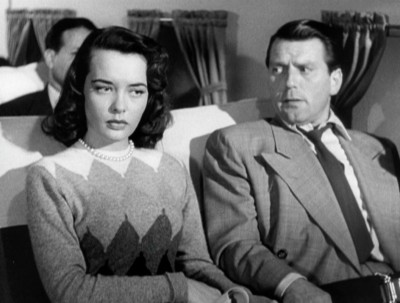
It's hard to believe (and I've got the newspaper ad to prove it), but when I was a kid in the early 70s, Roadblock was still showing up on the very bottom of triple bills at one of our more rundown local drive-ins--remarkable for a relatively unheralded (at the time) black and white effort from the 1950s. For whatever reason, that owner must have known that title and that ad copy would attract ticket buyers, because it showed up once a summer there (or more likely, he had his own pirated print...). Today, surely with the ranks of Hollywood B programmers thoroughly and completely trolled for noir codification, a movie like Roadblock may not have the instant name recognition with the general public that say Touch of Evil or Scarlet Street or The Maltese Falcon possess, but it is known to lovers of the genre--not so much because it's an "important" or thoroughly successful example of the genre, but because it's an enjoyable one, with some nice noir touches here and there. And of course because of the presence of its star, noir icon Charles McGraw.
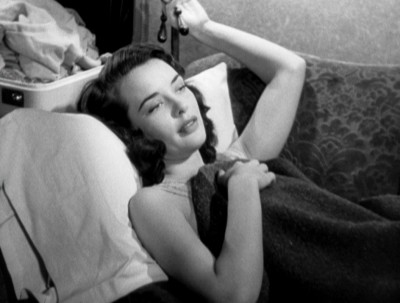
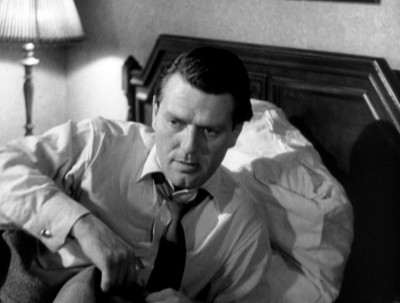
With a small-budgeted, quickly-shot B like Roadblock, one can always be tempted to blame its structural problems on dollars and minutes, both of which may been further hampered here by the general craziness that was going on over at Howard Hughes' RKO at the time. However, there's no getting around the fact that Roadblock's biggest stumbling block is poor character development; specifically, the instantaneous 180 degree switch in our noir femme fatale's moral code, going from bad girl who probably would have participated, let alone merely supported, her new lover's plan to get more dough by robbing a mail train, to good girl who wants marriage and kids with very little provocation in the script. I've read a few reviews that also feel McGraw's character's turnover to criminal is too abrupt and unbelievable, but at least it's given a little more build-up here. After all, he's shown at the beginning of the movie pretending to be a crook--and doing a pretty good job at it. After meeting the corrosively hot Diane (Joan Dixon not taking off with the public is a big mystery), you can feel Joe's quietly growing desperation that this piece of ass is going to not only pass him by...but make fun of him in the process (we believe him when he says, "I want you so bad I can't think straight,"). He kind of figures he has a shot with her, but he can't be sure, what with her running hot and cold (insulting him one minute, and kissing him the next), driving him increasingly frantic with lust and anger at the teasing humiliation. She sums it up perfectly when she prophetically announces, "Someday you'll want something nice and expensive you can't afford," to which he asks, "Like what?" to which she flatly responds, "Like me." With Dixon making Diane's temptingly explosive eroticism palpable to us, we get how McGraw would contemplate throwing away his whole career (and moral compass) just to go to bed with her. Wouldn't you?
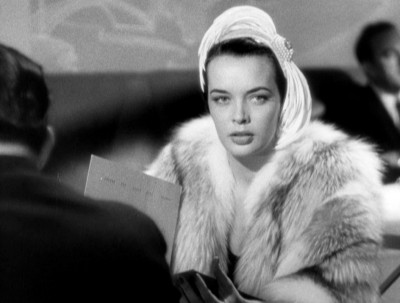
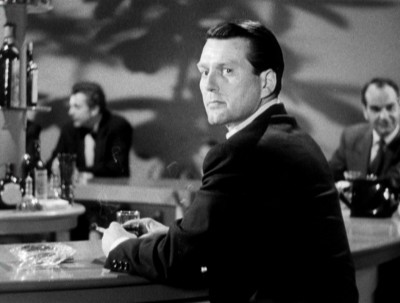
However, there's almost zero motivation for Diane's switch, save for one humiliation from Webb (the only one we see, by the way): he leaves her alone on Christmas to spend the holiday with his family. That's it? That's all it took for this little chiseler to have an epiphany? You mean to tell me that hard little chippie didn't have that happen to her before...or did the same thing to some other poor slob? Suddenly, she's a little girl crying to Joe to take her away from everything...including all that dough she's been striving for? It's just too abrupt, too absolute a change to be believable, given the scant information we have on her relationship with criminal mastermind Webb. It's a personality switch that immediately takes us out of Roadblock's suspension of disbelief, making even the most willing of us say, "That simply doesn't ring true." And from that point on, Roadblock doesn't so much lose us as it becomes just another meller with some okay twists and turns. What could have top grade noir--if only she had been scamming him all along, with Webb, to take the money, driving him completely over the edge--becomes only competent melodrama, and far less interesting.
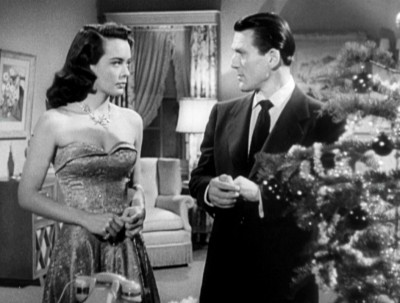
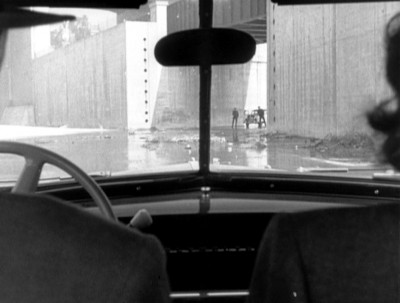
Still...there are enough fun aspects to Roadblock to recommend a viewing. Scripted by George Bricker (She-Wolf of London, The Whip Hand, Macao) and Steve Fisher (Dead Reckoning, Lady in the Lake, The Big Tip-Off), and directed by Harold Daniels (The Woman From Tangier, Sword of Venus, House of the Black Death), Roadblock has some nice touches, like the opening credits that look like the old road signs that used to be painted directly on the asphalt, caught in the headlight beams, or Daniels' use of the train motif throughout the movie, signaling among other things (escape, the loneliness of the characters in that whistle sound), the childishness of Joe in thinking he can get away with his scheme (he's transfixed at the sight of that little toy train at the general store). Even better is the hard-boiled dialogue, delivered without the slightest trace of self-consciousness (a state of being that is crippling increasingly inverted American movies today), such as McGraw offering, "If you ever need insurance, look us up," to the bank robber he scams, and the movie's funniest, most cynical line, perfectly delivered with bemused wonder by Gilmore when he ponders "Honest Joe's" fall from grace: "Just goes to show you...you can't trust anybody,"). And of course, there's McGraw, with a face that looks like it was smelted and stamped out of pig iron, his beady, flat eyes taking in everything...and then nothing once he's under the spell of sultry Dixon. He's perfectly cast here, coming off first as totally in control and tough as nails, then angry and confused at his own emotions for Dixon, then slowly panicking as he realizes he's can't get ahead of his own plan, to resigned to his fate at the final showdown, in the celebrated car chase in the concrete Los Angeles riverbed. Like the rest of Roadblock, it's a sequence that doesn't bear too close scrutiny in terms of logic (if you wanted to show "doomed fate," you could have had a smart cookie like Joe flee more logically than he does here)...but it does succeed, nonetheless, at least in terms of noir sensibility brought to visceral reality.
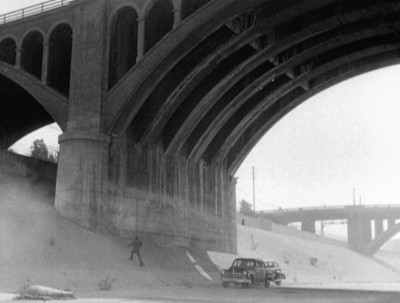
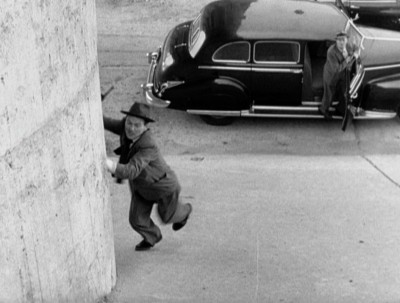
The DVD:
The Video:
The fullscreen, 1.37:1 black and white transfer for Roadblock looks good, with a relatively clean print, okay contrast (sometimes a little blown out), and the expected level of screen imperfections, like dirt or scratches.
The Audio:
The Dolby Digital English mono audio track is serviceable, with low hiss and little fluctuation. No closed-captions or subtitles.
The Extras:
No extras for Roadblock.
Final Thoughts:
Maybe with some more screentime to explain some troubling details...or maybe more money. Roadblock promises a lot during its first half, with some smart, cutting hardboiled dialogue and an intriguing set-up that promises first-rate noir. Unfortunately, a completely arbitrary, unbelievable shift in the femme fatale's motivation undercuts the movie's raison d'etre, and we're left with an enjoyable--but minor--crime thriller. Still...the presence of sultry Joan Dixon and squat, rasping Charles McGraw make Roadblock recommended viewing for fans of the genre.
Paul Mavis is an internationally published movie and television historian, a member of the Online Film Critics Society, and the author of The Espionage Filmography.


|
| Popular Reviews |
| Sponsored Links |
|
|
| Sponsored Links |
|
|
| Release List | Reviews | Shop | Newsletter | Forum | DVD Giveaways | Blu-Ray | Advertise |
|
Copyright 2024 DVDTalk.com All Rights Reserved. Legal Info, Privacy Policy, Terms of Use,
Manage Preferences,
Your Privacy Choices | |||||||









